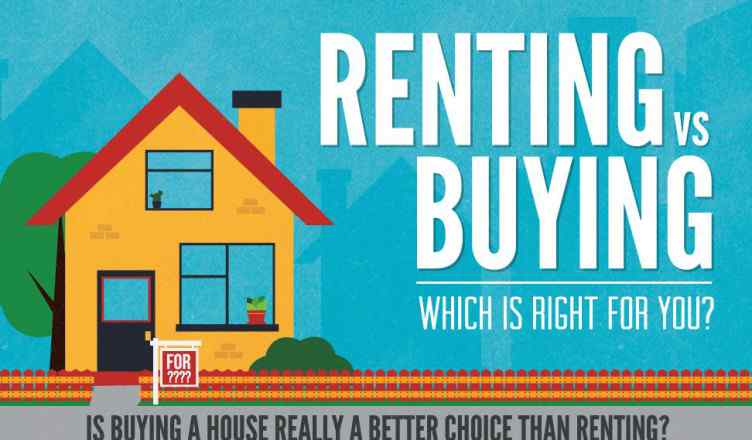
You have recently graduated from college and are ready to actualize the American dream. As you make the all-important transition from college life to adult life, you are facing a dilemma: Is it time to become a first time home buyer and buy your first home or should you keep on renting as you did in college? If you don’t answer this question correctly, you might live to regret your decision for the next 5 to 10 years. There’s a lot to consider before deciding to buy or rent your first home. Here we lay out the options when it comes to comparing renting vs buying.
Benefits of buying a home
- Building equity
The thing about renting is you are still paying off a mortgage in most cases. The only difference is that it belongs to someone else. In other words, you are creating equity for someone else rather than doing it for yourself. Since you must pay to live somewhere, wouldn’t it be better if you were creating a valuable asset for yourself at the same time? If you are a homeowner, you will build equity every time you pay your mortgage rates.
- Creative freedom
As a homeowner, you don’t have to answer to a landlord. All the home improvement and decoration choices will be up to you. Unlike renting, you don’t have to seek permission to knock down that wall, upgrade your kitchen or change the bathroom tiles as long as you operate within Homeowners’ association rules. Remember that any home improvement you make will increase the value of your property.
- Putting down roots
Because you will stay longer in your home as an owner than as a renter, you are more likely to put down roots in your neighborhood. You are likely to take an active interest in the community like volunteering in the community center or joining the local neighborhood association. You may not be able to do such things as a renter since you know you may be moving away in a year or two.
- Tax benefits
The tax benefits associated with being a homeowner might be enough to make someone buy their own home. You will enjoy many tax benefits from the time you buy your house up until the time you decide to sell it. Apart from deducting property taxes and mortgage interest, which will significantly reduce your annual tax liability, you can also reduce your taxable capital gain when you finally decide to sell your house.
Downsides to buying a home
- Limits your freedom of movement
Your lease while renting might not exceed a year. You have the freedom to move whenever the lease expires. If you’re a homeowner, you can’t afford such luxury. What will you do with your house if you decide to take off for a year for example? Furthermore, you will need to stay in your house for at least three years to recover your initial cost of purchase.
- Managing a home is time-consuming
You will spend more time maintaining and improving your new home than you ever did while renting. You can no longer call the landlord when the toilet leaks. Get ready to handle such issues on your own or hire someone to do it for you. Also, learn how to keep track of things such as when to change the heating filter.
- High upfront costs
You will incur high upfront costs when buying a home. Your costs will depend on the size of the down payment you put up and the value of the house. Expect to pay no less than 5.5% of the total value of the home for an FHA home loan. But the cost could be as high as 20%. On the other hand, you will pay relatively low upfront costs as a renter.
- Hidden costs
You should not just compare mortgage rates and rental prices when weighing the cost of buying against renting. Buying usually involves other hidden costs including property tax, insurance and maintenance and repair costs.
Factors to consider when choosing to buy or rent
Renting vs buying is not an easy decision to make. There are many factors to consider. You should answer the following list of questions first.
Do you qualify for a mortgage?
Getting a mortgage can be difficult. It can be especially difficult getting approved with bad credit or if you don’t have much of a credit history. Did you own a credit card while in college? Did you pay your debt on time always? If you answered in the affirmative to both questions, then your credit should be okay.
Can you live in the particular community for years?
You need to research on a neighborhood before you decide to settle. You shouldn’t just buy a house because you can afford it. Is your neighborhood safe in the first place? Will it favor your lifestyle?
Should you rent first before buying?
If you’re buying a house in a particular neighborhood, you need to be sure you like the place. Sometimes research may not be enough. Rent for one year first to get a feel of the area. If you still love the place after that, then you can go ahead with the purchase.
Are you comfortable putting so much money into a single thing?
Buying a house can be costly. You must have saved money during college to afford the down payment. If you are investing all your savings in one asset, then you should take time to consider whether it is worth it. Is buying a house a priority at the moment or should you invest your money in another worthy cause?
What can you afford to buy?
Buy only what you can afford. Remember you have other expenses to consider. You could still be paying your college loan for example. Don’t go for the highest mortgage value just because the bank is willing to give it to you. You don’t have to strain to pay your mortgage rates every month.
What is your plan for the future should you continue renting?
You are probably not planning to rent for the rest of your life. Therefore, you need to figure out a way save money or to invest in the meantime. Remember you’re not building any equity by paying your monthly rent. So you need to have a plan to chart the course for your future.
There are many decisions to make when you’re moving into the next phase of your life after college. You will need to own a house at some point down the road. Whether this is the right time for that is a personal decision you will need to make. But before you commit to something, weigh all the pros and cons in renting vs buying since you might have to live with the decision for a very long time.











